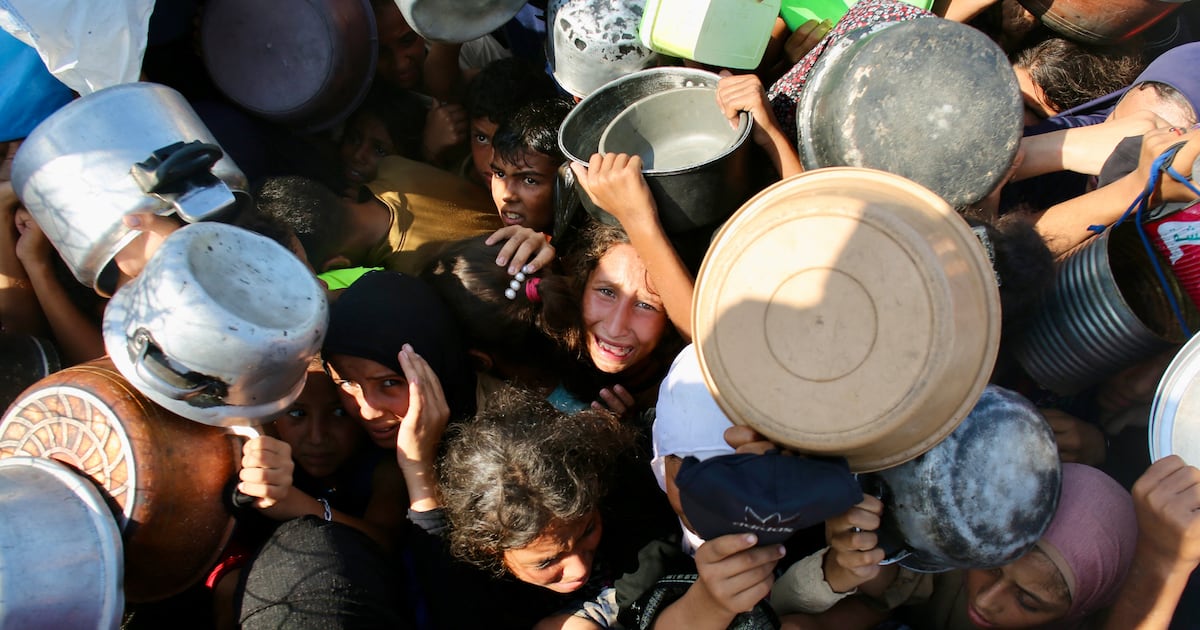World
Gaza Faces Starvation Crisis as US Envoy Pushes for Ceasefire

Health officials in Gaza report a troubling surge in deaths attributed to starvation and malnutrition, following extensive restrictions on food and humanitarian supplies imposed by Israel. Over the past 24 hours, Gaza’s health ministry documented ten new starvation-related fatalities, raising the total to 111, with most occurring in recent weeks. This alarming situation has prompted over 100 aid organizations to issue a joint plea for an immediate ceasefire between Israel and Hamas, emphasizing the urgent need for unhindered access to humanitarian aid.
The humanitarian crisis in Gaza has reached a critical point, with a collective statement from 111 agencies highlighting that aid workers are increasingly joining food lines, risking their safety to provide for their families. The organizations emphasized that supplies have been wholly depleted, stating, “As the Israeli government’s siege starves the people of Gaza, aid workers are now joining the same food lines, risking being shot to feed their families.”
On March 15, 2024, US envoy Steve Witkoff is scheduled to arrive in Rome to discuss potential ceasefire arrangements with Israeli Strategic Affairs Minister Ron Dermer and a senior envoy from Qatar. The US State Department has expressed optimism, stating there is “a strong hope that we will come forward with another ceasefire as well as a humanitarian corridor for aid to flow.” If progress is made, Witkoff may continue to Doha later in the week to further negotiate terms.
International pressure on Israel has intensified recently. On March 14, 2024, 28 foreign ministers from various countries, including Ireland, the United Kingdom, Canada, and Japan, called for an immediate end to hostilities, citing the severe suffering of the Gazan population. European Union Foreign Policy Chief Kaja Kallas warned that “all options remain on the table if Israel doesn’t deliver on its pledges” to enhance humanitarian aid flows into Gaza.
Aid agencies report that “massacres at food distribution sites are occurring almost daily” at locations established by the US-Israel Gaza Humanitarian Foundation, which has been operational for two months. The United Nations confirmed on July 13, 2024, that 875 Palestinians have died while seeking food.
Prominent organizations such as Oxfam, Save the Children, Amnesty International, Doctors Without Borders (MSF), and the Norwegian Refugee Council are part of the coalition urging for immediate action. They reported that vast quantities of food, water, medical supplies, and fuel remain inaccessible in warehouses both inside and outside of Gaza. An aid worker described the grim reality, stating, “Children tell their parents they want to die, because at least heaven has food.”
Currently, aid deliveries are insufficient to meet the urgent needs of 2.3 million residents of Gaza, with reports indicating that many have gone weeks without assistance. The agencies noted that “doctors report record rates of acute malnutrition, especially among children and older people.” As illnesses like acute watery diarrhea spread, conditions worsen, with empty markets and increasing waste contributing to the crisis.
Palestinians find themselves caught in a relentless cycle of hope and despair, awaiting assistance and ceasefires that do not materialize. The psychological toll of this ongoing conflict compounds the physical suffering, with aid agencies describing survival as “dangled like a mirage.”
The spokesperson for the Israeli government has not responded to requests for comments regarding the aid agencies’ statements. Israel maintains that it is not responsible for food shortages, despite controlling all supplies entering Gaza. According to Gaza authorities, Israeli forces have killed nearly 60,000 Palestinians since the onset of hostilities in response to attacks by Hamas, which resulted in the deaths of 1,200 individuals and the capture of 251 hostages in October 2023.
As the situation remains precarious, the call for immediate action from the international community becomes ever more critical.
-

 Top Stories3 months ago
Top Stories3 months agoTributes Surge for 9-Year-Old Leon Briody After Cancer Battle
-

 Entertainment4 months ago
Entertainment4 months agoAimee Osbourne Joins Family for Emotional Tribute to Ozzy
-

 Politics4 months ago
Politics4 months agoDanny Healy-Rae Considers Complaint After Altercation with Garda
-

 Top Stories4 months ago
Top Stories4 months agoIreland Enjoys Summer Heat as Hurricane Erin Approaches Atlantic
-

 World5 months ago
World5 months agoHawaii Commemorates 80 Years Since Hiroshima Bombing with Ceremony
-

 Top Stories3 months ago
Top Stories3 months agoNewcastle West Woman Patricia Foley Found Safe After Urgent Search
-

 Top Stories5 months ago
Top Stories5 months agoFianna Fáil TDs Urgently Consider Maire Geoghegan-Quinn for Presidency
-

 World5 months ago
World5 months agoCouple Convicted of Murdering Two-Year-Old Grandson in Wales
-

 World5 months ago
World5 months agoGaza Aid Distribution Tragedy: 20 Killed Amid Ongoing Violence
-

 World5 months ago
World5 months agoAristocrat Constance Marten and Partner Convicted of Infant Murder
-

 Top Stories4 months ago
Top Stories4 months agoClimbing Errigal: A Must-Do Summer Adventure in Donegal
-

 Top Stories4 months ago
Top Stories4 months agoHike Donegal’s Errigal Mountain NOW for Unforgettable Summer Views









